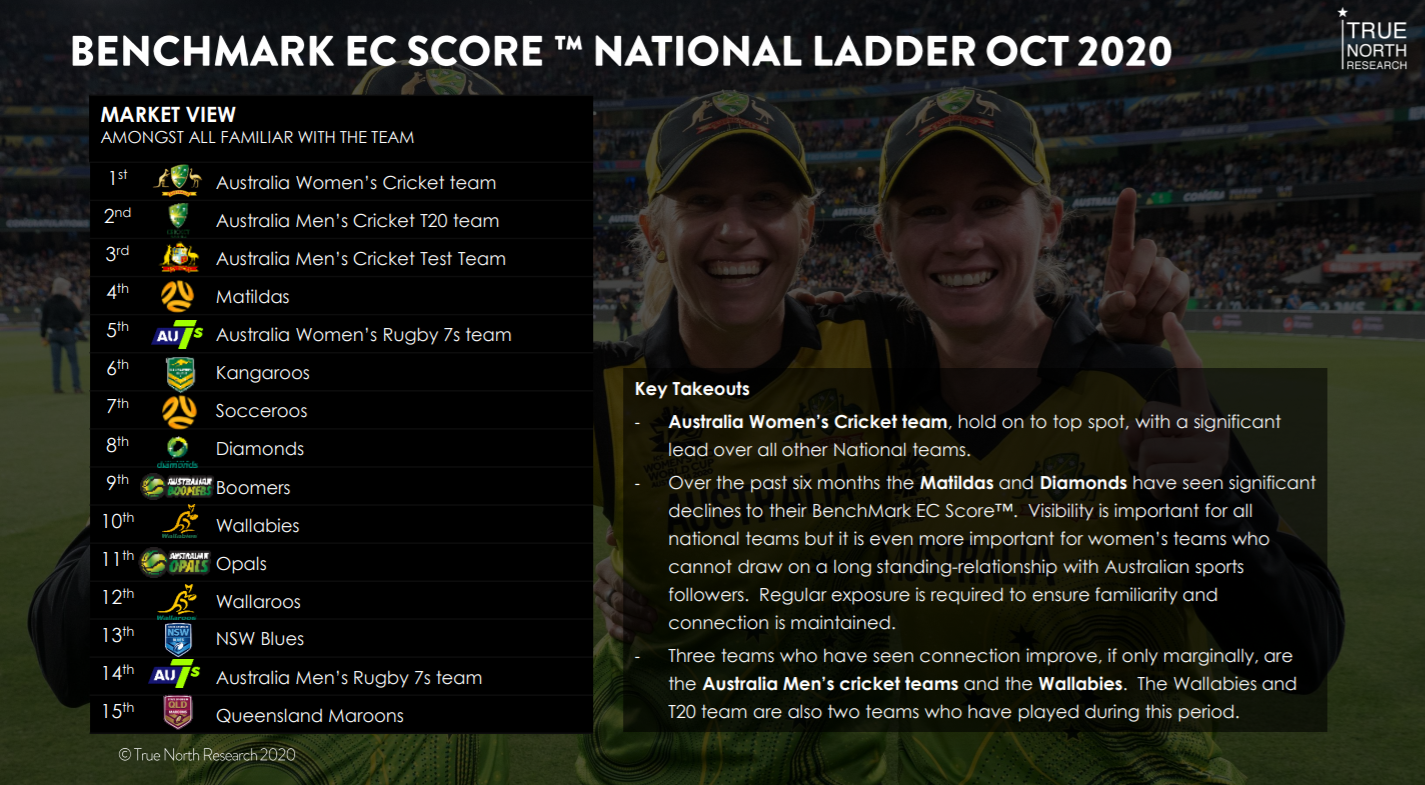Among those familiar with the team, the Australia Women’s Cricket team is number one on the latest National BenchMark EC Ladder, which assesses Australians’ emotional connection to sport.
The Australian Women’s Cricket team has maintained the strongest BenchMark EC Score among those familiar, during a difficult period that has seen emotional connection to many Australian sporting teams decline.
The study, the fifth in a series by True North Research, was conducted in October 2020 and based on a sample size of 3,822 Australian residents aged 16 and over.
It finds that COVID-19 has negatively impacted the nation’s overall engagement with sport, lowering familiarity, the size of supporter bases and emotional connection.
Many teams have seen their BenchMark EC Score fall, including significant declines for the Matildas (down from second to fourth) and Diamonds (down from fourth to eighth).
Furthermore, five of the seven national teams that have seen the biggest decreases to familiarity over the past two years are teams that would have played in the Olympics in 2020.
Three teams that saw connection improve, if only marginally, include the Australia Men’s cricket teams and the Wallabies. The Wallabies and T20 team are also two teams who have played during this period.

However, among a team’s core fans (distinct from those who follow but not closely), the connection has strengthened as sport has become even more important, helping fans get through the challenges of 2020, according to the report.
“Our cornerstone touchpoints that connect teams to new and existing audiences have been significantly impacted,” True North director Georgie Maynard said in a statement.
“There have been fewer opportunities to attend live sport, interact with players, and participate at grassroot levels.
“Growth for sport will be tough over the next year with the casual viewer tuning out and concerns around attending live sport, as a result of COVID-19, still evident. However, for existing fans, sport has provided a necessary distraction and an important relief from the pandemic.
“This has resulted in an audience that is even more passionate and connected to its teams.”
The research also finds that some demographic audiences have watched less sport over the past six months.

Women, those aged 30–39, those on lower incomes, living alone, and single parents, are significantly more likely to have watched less sport.
This reflects the impact of the additional mental and financial load of COVID-19 on particular demographic groups, True North said. It also reinforces how important the social side of sport is to maintaining audiences.
Maynard added: “It is not just about fewer opportunities to engage with sport, COVID-19 has led some audiences to lose interest, whilst others have not had the capacity to connect, they have competing priorities.
“However, given the power of sport to connect us, it will be important that sport reaches out to the audiences who have struggled during this time, who may be feeling a sense of exclusion, and actively re-establishes that emotional connection.”
According to the research, there are also distinct geographic differences.
Three in ten Victorians have watched less sport, while in Queensland there has been a net gain, with more watching sport than previously. Queenslanders have benefited from sporting codes moving to the state and setting up hubs, increasing visibility and connection.
For more information about the evaluation, visit www.truenorthresearch.com.au.
Featured image source: RANDY BROOKS/AFP/Getty Images








